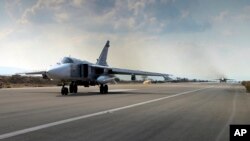Russia has warned it could take unilateral action beginning Tuesday against those who violate the nearly month-old cessation of hostilities in Syria.
The move comes after complaints that the U.S. has been slow to work with Russia on rules for jointly monitoring violations. The two countries were key in bringing the halt in fighting that applies to pro-government and rebel fighters, but not attacks against terror groups.
U.N. envoy for Syria Staffan de Mistura, who is leading a second week of peace talks with Syria's warring sides, said Monday he is concerned about any breakdown in U.S.-Russian cooperation.
"The moment they don't talk substantively, we go back to the past and we cannot afford it, and they know it too," de Mistura said.
He said the cease-fire and corresponding increase in humanitarian aid are largely holding, but that he is concerned they cannot be sustained if there is a lack of progress on a political transition for Syria.
The U.N. has been working off a basic plan that includes a new constitution and elections. The future of President Bashar al-Assad has been a major point of contention between the Syrian government and its allies who say he does not have to leave power for the country to have peace, while the opposition and its backers say he must.
"It is clear that the political transition is the 'mother of all issues,'" de Mistura said after meeting with the government delegation Monday in Geneva.
The head of Syria's delegation at the peace talks, Bashar al-Jaafari, reiterated the government's stance, saying Assad's future has "nothing to do" with the negotiations.
De Mistura is meeting with the opposition on Tuesday as part of his process of indirect negotiations. He plans to continue meeting with both sides on Wednesday and Thursday before adjourning this round of talks. He has said he plans to launch the next round in April, though no definite date has been set.





